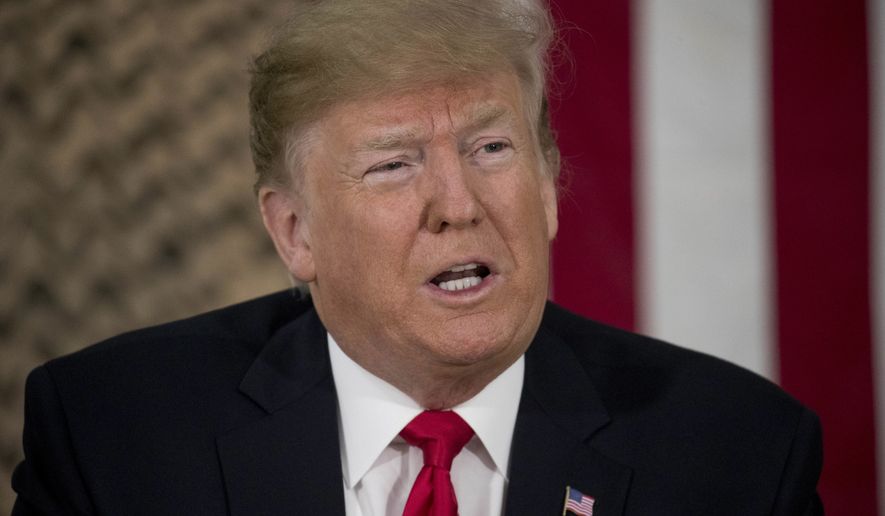OPINION:
The new year could well demonstrate President Trump’s brand of Republican economics — tax cuts, deregulation and tough policies on trade with China — really works.
In 2018, the president’s policies instigated nearly 3 percent growth, robust jobs creation and rising wages — a combination President Obama’s statism could not deliver. The prevailing narrative among the left-leaning financial press and Democratic Party is the economy is on a sugar high.
Household incomes got a jolt from personal tax cuts and those temporarily accelerated consumer spending. However, newly rising wages and lower gasoline prices — both enabled by Mr. Trump’s policies — are now giving a fresh boost to consumer spending power. Those should keep cash registers ringing well into 2019.
Deregulation is raising labor productivity, and permitting businesses to keep prices in check even as they raise wages. Pulling out the volatile energy food sectors, “core inflation” is flat lining in the range of 2 percent. Federal Reserve Chairman Jerome Powell has the opportunity to heed President Trump’s call for a more cautious interest rate policy.
The left-leaning media and Democrats have been on a relentless disinformation campaign asserting corporate America is pocketing their tax cuts, when they are in fact expanding capacity and adding employees.
It does not show up in large increases in investment spending, because most durable goods (other than cars and cell phones) are getting cheaper adjusted for broader inflation and relative to household incomes and business cash flow.
Want proof? Compare the price of a basic laptop, washer and dryer or color TV to what you or your parents paid 20 or 30 years ago.
As for business equipment and building space, Amazon is installing robots that not only reduce labor and operating costs but that could also slash up to $800 million from capital costs by cutting consumer-order cycle times from 60 minutes to 75 minutes to only 15, shrinking required inventory and reducing warehouse space by 50 percent.
Could you imagine Macy’s getting the same sales out of 50 percent fewer square feet?
Chrysler recently announced it will build a new assembly plant in Detroit at a cost of $1 billion. Back in the late 1980s, when I was working with Lee Iacocca on competitiveness issues, he bragged about putting up the new Jefferson Street Plant for $1 billion.
Over the last 30 years, economywide prices have doubled but the cost of a new auto plant appears to be about the same, because the proper application of modern supply-chain management, robots and artificial intelligence cuts machinery and building space requirements rather than adding to them, even as those save labor and enhance quality in making products.
Business spending is up even if brick-and-mortar and machinery spending are not rocketing. Enterprises are devoting a substantial portion of their savings on those items and taxes to training workers to implement, operate and maintain these new systems.
All of this is made possible by making business in America competitive again. Less regulation means less time moving paper and answering to bureaucrats and more time creating great new products and serving customers. Lower corporate taxes increases after-tax profits anticipated from investing in robots, artificial intelligence and a high-powered work force.
Finally, Mr. Trump’s critics hammer endlessly about the alleged negative effects of his tariffs on the auto industry and other manufacturers — in particular, the 25 percent duty on steel and 10 percent levies on aluminum and about $200 billion coming from China.
Detroit’s automakers are crowding all their new vehicle production into trucks and SUVs that benefit from a 25 percent tariff on everything going into a fully-assembled imported vehicle — steel and aluminum, components and software. We don’t see them climbing Capitol Hill to petition for its repeal.
As for other businesses, virtually all of the 10 percent tariff on components has been mitigated by a 9.5 percent drop in the value of the yuan. Most manufacturers who say the tariff is raising the cost of imported parts are either getting duped by suppliers or fibbing to stock analysts who can’t think outside the box.
If Mr. Trump’s tariffs were so tough, manufacturers would not be adding employees at a brisk pace.
The economy can keep on trucking, and 2019 will prove a year of redemption for the Trump economic team if the Fed shows restraint.
• Peter Morici is an economist and business professor at the University of Maryland, and a national columnist.




Please read our comment policy before commenting.